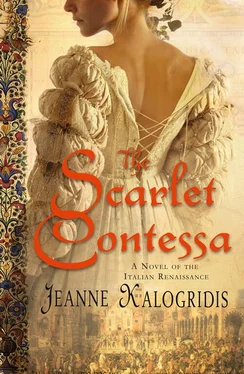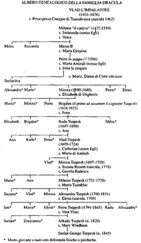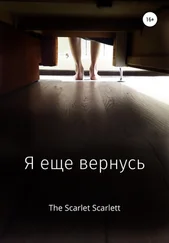Lorenzo’s card was the male version of mine—a white-haired, bearded man wearing the gold papal crown, with a gold cross atop his staff. But the card had been accidentally turned upside down, and at the sight of it, I felt a thrill of fear.
Lorenzo’s homely face grew solemn as he gazed upon it. “The pope, ill-dignified,” he said.
I stared back at it, too, and saw a thousand fleeting things, too numerous to give voice to: an old, vengeful man weeping over a dead son, the swirl of frankincense, the glint of a blade, a spray of blood, an oddly familiar voice sighing, Lorenzo . . . My fear must have been visible, for when I looked up again, the women were wide-eyed and silent, and Galeazzo, though frowning, was chastened.
I struggled to put all that I had seen into words. “There is vengeance here,” I said, “and sorrow, and great treachery. You must take care, or there will be blood.”
Bona crossed herself; the duke and Lorenzo shared a troubled, knowing glance. “I know how to deal with the matter now,” Lorenzo said, his tone firmly optimistic; I felt his words were not so much true as intended to comfort Duke Galeazzo. “I will take care. Thank you, Madonna Dea.”
“All this seriousness!” Galeazzo scolded. “Here now, this was meant as lighthearted entertainment.” He gazed sternly at me. “Read Cicco’s card now, and see to it that it doesn’t spoil our luncheon!” He nudged Lorenzo playfully as he addressed me. “Speak to us now of song and sport and love!”
I murmured an apology and turned over Cicco’s card. Ten glittering golden coins rested against a white backdrop decorated with flowers; I sighed with relief. “You will come into a good sum of money,” I told him.
Cicco gave the slightest of smiles and nodded; the duke grinned, pleased.
“That’s because I pay him too well!” Galeazzo quipped. “Now, let’s see if I am luckier than my secretary!”
I turned over the duke’s card. Like Lorenzo’s, it was upside down. Upon a throne, a crowned king sat in full gilded armor. In his left hand was a gilded shield, in his right, a long sword with a wicked sharp point. His hair appeared golden on the card, but my internal eye recognized a dark-haired man, a courtier wild with outrage, who had waved his sword at Lorenzo de’ Medici.
I felt a welling of dark satisfaction. “Here is justice at last,” I said.
The duke frowned. “Regarding which matter?”
I shook off the pull of the card and kept my wits. I wanted desperately to see what action this king of swords would take, and whether that action would succeed; I hoped that vengeance was coming at last to His Grace, but feared warning him. I did not want him to be able to protect himself.
And so I pretended to study the card further, then said, in as casual a tone as I could muster, “There is business that soon will be concluded, though not to His Grace’s favor, unless he take exceptional care.”
“Which business?” he persisted. The appearance of another negative symbol had awakened his ire; if I answered in a manner that displeased him, we would all pay.
I replied smoothly, “Political. I will speak no more of it, for I believe it concerns a secret matter. I have confidence that, should his Grace ponder the card, he will come to a clever solution to avoid the difficulty.”
He nodded, feigning understanding, and studied the card thoughtfully until Caterina, her blue eyes narrowed with curiosity, said to me, “So it’s true . . . your mother was a witch!”
I looked up sharply. Beside me, Bona turned to Caterina and hissed: “Mind your tongue!”
I had spent the past nine years of my life with Bona and had never heard her criticize Caterina, much less scold her in anger. Nor had the duke, who leaned across the table to give his wife a look that threatened imminent physical violence.
“Caterina jests,” Galeazzo said witheringly. And to prove it, he laughed, but when by accident I caught his eye, I saw the fear in it.
An hour before dusk I made my way down to Matteo’s chamber, ostensibly to rekindle the fire. In truth, I wanted to be alone so that I could cry. Since the appearance of the Hanged Man, I had been increasingly worried about Matteo. Bona had said that he would come today, but Bona was wrong; the triumph card had merely confirmed my feeling that something terrible had happened.
My mood had not been helped by Bona’s reaction to the deck—or, more to the point, her reaction to my reaction. After bidding Lorenzo a warm farewell, the duchess had returned to her chambers in uncharacteristic silence, clutching the red velvet box containing the cards. Upon arriving in her quarters, Bona had given it to one of the chambermaids, with instructions to “hide it well, where I will not soon set eyes upon it again.” Caterina, too, was unusually quiet, though her eyes were adance with amusement at the duchess’s and my discomfort.
I confess, I paid close attention when the chambermaid moved toward a trunk set in a corner near the duchess’s bed, opened it, and slipped the box beneath a fur throw.
While Bona retreated to her wardrobe to change into less restrictive attire, I moved to the front of the chamber to gaze anxiously out the window overlooking the duke’s hunting park. Caterina followed, and when I was certain the duchess was thoroughly distracted, I asked the girl, “Madonna, why did you say that? About my mother being a witch?”
“You should have seen your eyes,” Caterina hissed, widening her own until the whites showed ghoulishly. “There were times, I swear, when you had no idea where you were . . . you were carried off by visions!”
Impatient, I pressed: “What has this to do with my mother, Madonna? You speak as though you’ve heard rumors.”
“I have,” she said coyly.
“From whom?”
“From Nonna Beatrice,” she replied. Nonna had been Bona’s girlhood nurse and had accompanied the duchess from Savoy when the latter had married Galeazzo; Nonna had died the previous year. “She said your mother was a witch and saw the future.”
I controlled the urge to shake the duke’s favorite daughter by her shoulders. “What else did she say about her? What else?”
Caterina shrugged; her shell pink lips curved upward in delight at my agitation. “Just that.”
Nothing I said could force her to say more. Shortly afterward the duchess joined us, with the curt remark: “No good ever came of fortune-telling.”
With that, Bona dismissed the subject completely and ignored all of Caterina’s attempts to revive it. I spent the rest of the day marking the movement of the sun and struggling to suppress my growing dread. When dusk came, Bona dismissed me. While she was undressing and the chambermaids distracted, I did an unthinkable, inexplicable thing: I went to the trunk, slipped my hand beneath the fur throw, and made off with the diamond-littered velvet box. I wrapped my shawl tightly around me, tucking the hand that held the box beneath it, around my waist, and headed down to the first-floor loggia, bound for Matteo’s apartment.
Lorenzo was there, leaving one of the guest quarters with his two gentlemen; the three of them wore cloaks and caps and riding gloves, and carried saddlebags. My hand was on the door when Lorenzo caught sight of me and waved.
“Madonna,” he called, and handed his saddlebag to one of the men, then gestured to both of them to go on to the stables ahead of him. It was an odd hour, I thought, to be setting out for distant Florence.
“A word with you,” he said as he approached. But the loggia was crowded with servants headed wearily back to their quarters; a pair of Cicco’s apprentice clerks brushed past us, laughing and joking. Lorenzo looked pointedly at the door handle to Matteo’s room. “Might it be a private word, Madonna Dea?”
Читать дальше












